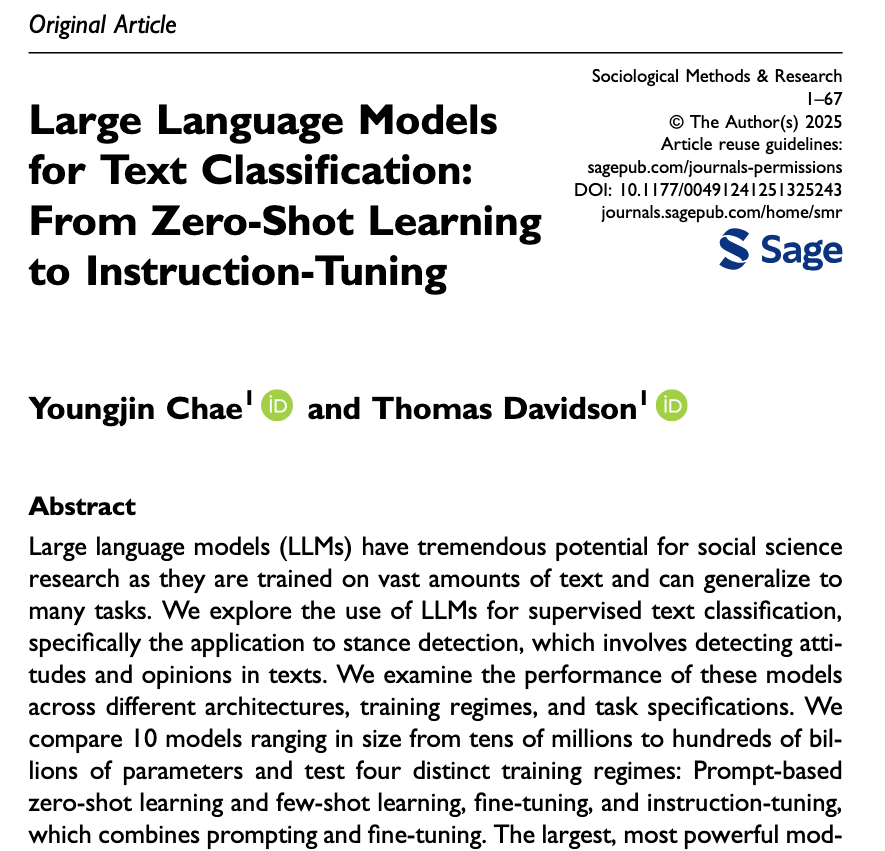
Youngjin YJ Chae
@yjin_chae
sociology phd student at rutgers; institute for health. family demography, computational sociology, and population health.
Excited to share a work with @thomasrdavidson on using LLMs for text classification! We experiment with different learning regimes from zero-shot to instruction-tuning, and propose instruction-tuning as a new possibility for social scientific inquiries. doi.org/10.1177/004912…

Brandon Stewart, Associate Professor of Sociology at Princeton University, will be a keynote speaker for #IC2S2 2025 in Norrköping, Sweden. 🎙Design-Based Supervised Learning: A General Framework for Using LLM Annotations and Other Predicted Variables in Downstream Analyses.
It's #SICSS O'clock!!!! Hundreds of students all over the world are learning about computational social science *for free* thanks to the brilliant young scholars who dedicated their time this summer to train the next generation-- from Colombia to Kenya! sicss.io
🚨A warning to anyone using @OpenAI API credits for research 🚨 We were hit with $1K+ excess charges despite their documentation clearly stating API calls would stop when credits ran out. Their support refused to help and threatened to cancel our account. 1/7
Over at the blog, I write about a few interesting articles about place (link in next post). Features of place matter for suicide rates. Features of place are really changing.
🎉 Huge news! Our paper 'A semantic embedding space based on large language models for modelling human beliefs' is finally out in @NatureHumBehav! This research uses LLMs to build a 'map' of human beliefs and reveals why people adopt certain beliefs through relative dissonance.
Happy to share this new paper with @beckyj1! ✏️
Excited to share a new paper with @simonezhang on parental perceptions of using algorithms to allocate scarce resources in schools, now out in Sociological Science (@SociologicalSci)! (1/5)
📈Thanks everyone for the amazing response to my first post! I've uploaded the second stats lab with R for beginners on my webpage. The topic is "What Does It Mean to “Control” in Regression Analysis?" idlhy0218.github.io/page%20buildin… #rstats #econ #stats #statistics #data
How can we leverage generative AI to advance social science methods and research? Daniel Karell and @thomasrdavidson led a special issue in Sociological Methods & Research to find out. Special kudos to them! journals.sagepub.com/doi/10.1177/00…
New Paper in AJPM 🌱 Yes, one of my favorite journals 🥰 Area-level education is known as a protective factor for health (i.e., human capital spillover). However, this spillover effect is unequal. It benefits well-educated people while it harms less-educated people. (1/4)
Updated version now out Sociological Methods & Research Paper link: journals.sagepub.com/doi/10.1177/00… Preprint link: osf.io/preprints/soca…
New working paper on the emerging use of AI among online survey participants: Focusing on open-ended Qs, we study how often and why survey-takers use AI. We also compare human vs LLM written answers to sensitive questions. 🔗: osf.io/preprints/soca…
An important study demonstrating how AI generative content is affecting our data, whether we like it or not! I have also come across this issue in my recent open-ended data collection.
Updated version now out Sociological Methods & Research Paper link: journals.sagepub.com/doi/10.1177/00… Preprint link: osf.io/preprints/soca…
Mixed feelings about silicon subjects (LLM predictions of human behavior) as replacements for human subjects? Consider the mixed subjects design. 🚨Now published at Sociological Methods and Research🚨 doi.org/10.1177/004912…
Our article on using LLMs for text classification is out now in SMR! We compare different learning regimes, from zero-shot to instruction-tuning, and provide recommendations for using these models for sociologists and other social scientists. doi.org/10.1177/004912…
We made some big updates to our work on LLMs for text classification. New analyses show how instruction-tuning can help with more complex prediction tasks and that Llama3 70B can compete GPT-4o at conversational stance detection. Feedback welcome! doi.org/10.31235/osf.i…
Updated preprint online: I use conjoint experiments to evaluate GPT-4o and Qwen2 vision-language models for contextualized hate speech detection. Larger models tend to perform similarly to humans, but racial and lexical biases persist. 1/2 osf.io/preprints/soca…
New preprint proposing conjoint experiments to audit generative AI I assess how GPT4o makes content moderation decisions and compares with human subjects, particularly how author identity and other context mediate the evaluation of slurs 🤖🧑🦱😡🗯️💻 osf.io/preprints/soca…
New year --> new adventures! Next quarter @StanfordGSB I’m thrilled to be teaching a PhD seminar on “Theoretical Computational Social Science.” We will explore the possibility of shifting away from a methods-based definition of CSS to one grounded in a unifying theoretical…
Our Polarization Lab at Duke hopes to hire another post-doc this year-- apply below and/or please share with people who might be interested: academicjobsonline.org/ajo/jobs/29305
Excited to share my paper on unemployment and suicide with @pescosol. Using big administrative data on suicide, we show that unemployed people are more likely to die by suicide, but their suicide risk is lower when and where more people are unemployed. doi.org/10.1177/000312…